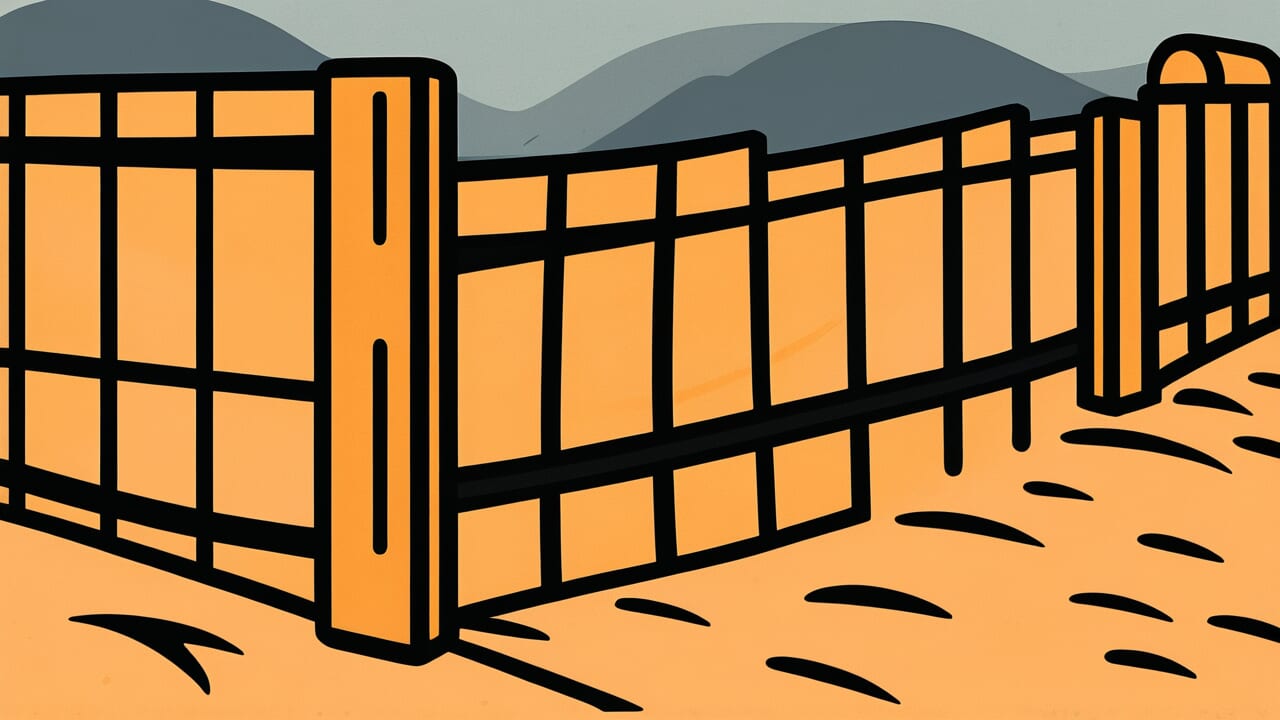How to Read “A plasterer’s fence”
Sakan no kakine
Meaning of “A plasterer’s fence”
“A plasterer’s fence” is a proverb that means things outside your specialty won’t go well. It shows that even a plasterer, an expert at coating walls, won’t get good results when trying to build a fence, which is different from their actual work.
This proverb is used when someone tries to do something unfamiliar outside their area of expertise. It points out the reality that even highly capable people can’t achieve the results they want in fields outside their specialty.
In modern times, we live in an era that demands multitasking and diverse skills. Yet this proverb still conveys an important truth.
To do truly high-quality work, you need deep experience and specialized knowledge in that field. This connects to the idea of being a jack of all trades but master of none.
Being somewhat good at everything is completely different from mastering one thing.
Origin and Etymology
No clear written records remain about the origin of this proverb. However, the structure of the phrase reveals an interesting background.
A plasterer is a specialized craftsman who coats walls and floors. They handle plaster and mortar, possessing advanced skills to create beautiful, smooth wall surfaces.
A fence, on the other hand, is a garden partition made by assembling bamboo or wood. This originally falls within the domain of carpenters or gardeners.
During the Edo period, a strict division of labor was established in the world of craftsmen. Each craftsman took pride in their specialized field and honed their skills through years of training.
Even if a plasterer was a master at coating walls, they didn’t have the skills to assemble bamboo and build a fence. The way materials are handled, the necessary tools, and the required sensibilities are completely different.
This proverb is thought to have emerged from the reality of such a craftsman society. If you venture outside your specialty, even a first-class craftsman becomes like an amateur.
The proverb expresses this lesson by citing specific occupations. It conveys the importance of specialization in the world of craftsmen in a way anyone can understand.
Usage Examples
- He’s excellent at sales, but when we assigned him accounting work, it was like a plasterer’s fence
- When I, a programmer, tried to do design work, it was a plasterer’s fence, so I ended up hiring a professional
Universal Wisdom
“A plasterer’s fence” teaches us an obvious but easily forgotten truth. Human abilities always have strengths and weaknesses.
Sometimes we get drunk on our own success stories and fall into the illusion that we can do anything. People who achieve results in one field are especially prone to believing their confidence applies to other areas too.
But reality is harsh. Specialization cannot be acquired overnight.
This proverb has been passed down for so long because it functions as a warning against human omnipotence. Even an excellent craftsman is inferior to an amateur outside their specialty.
This humility was the spiritual pillar that supported craftsman culture.
At the same time, this proverb has played a role in protecting the value of specialization. Precisely because not everyone can do everything, each specialist is needed.
The proverb quietly speaks to the importance of respecting each other’s specialties and cooperating with one another.
The more complex human society becomes, the more impossible it is for one person to handle everything. Know your own limits and recognize others’ specialties.
That wisdom is embedded in this simple proverb.
When AI Hears This
The more a plasterer masters wall-coating techniques, the less able they become to build fences with the same trowel. This phenomenon can be explained in cognitive science as “context dependency of procedural memory.”
In other words, as an expert’s brain automates specific movements, it strongly binds those movements to specific purposes.
Research shows that experts can sometimes have less flexibility than beginners. In chess experiments, when grandmasters were shown boards with unusual piece arrangements, some cases reported slower judgment than beginners.
In the plasterer’s case, using the trowel thousands of times as “a tool for coating walls” strengthens the neural circuit of “trowel equals wall coating” in the brain.
Then, when facing a fence with a different three-dimensional structure, the brain cannot call up the appropriate movement pattern even though it’s the same tool.
What’s interesting is that this isn’t just a technical problem but a cognitive one. Physically, it should be possible to build a fence with a trowel.
Yet cognitive specialization through mastery paradoxically robs one of adaptability. This is also why transferring to different fields is difficult in today’s highly specialized society.
The deeper you develop specialization, the more you lose the cognitive flexibility to use that knowledge in different contexts. This proverb sharply points out the paradox of mastery.
Lessons for Today
What this proverb teaches modern you is the importance of knowing your strengths and polishing them. When you look at social media, people who can do everything might seem to shine.
But truly valuable work lies beyond deeply pursuing one thing.
What matters is having the courage to acknowledge what’s outside your specialty. Being able to honestly say “this isn’t my area of expertise” isn’t weakness but a sign of deep self-understanding.
And by relying on specialists in that field, better results are born.
At the same time, this proverb teaches respect for others. When someone struggles outside their specialty, don’t laugh at them. Instead, complement each other with your respective areas of expertise.
Such cooperative relationships create a rich society.
You have something only you can do. Find it, polish it, and take pride in it. And respect others’ specialties too.
Only when you have both of these does a fulfilling life open up before you.



Comments